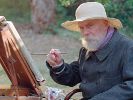Eye For Film >> Movies >> Renoir (2012) Film Review
Renoir
Reviewed by: Sophie Monks Kaufman

First there was Pierre-Auguste Renoir, the Impressionist painter. Then came his son, Jean Renoir, director of La Grande Illusion and La Regle du Jeu – the delicate class satire regarded by learned folk as one of cinema’s greatest offerings. Now Gilles Bourdos, a Gallic director best known for his thrillers, has chanced his arm at resurrecting the 1915 summer spent by father (Michel Bouquet) and son (Vincent Rottiers) on the French Rivera. It might not be a Renoir, in either of the two historic senses, but it is an elegant and enjoyable drama filled with beauty, passion and a near sublime gentleness of spirit.
A 2003 fictionalised book by Jacques Renoir (yep, that dynasty is still going) called Table Lovers is the basis for what starts as a family drama but morphs into a love story. Andree, a young model sent to keep the painter active as a last act by his now dead wife finds more meaningful occupation as the film-maker (before he was a film-maker)’s amour.

The historic veracity of how convalescing First World War cavalryman Jean fell for poor beauty Andree, before she became an actress with a new name, Catherine Hessling, is up for discussion. Yet veteran cinematographer Mark Ping Bing Lee’s sun-kissed landscapes conjure a setting worthy of one of his previous titles, In The Mood for Love. His is a picture-perfect world for both the painter who refuses to use black and the young ‘uns with their romantic urges.
Tenderness is where Renoir is most persuasive. Attractive and capable leads give whole-hearted performances. Jean sees Andree in her birthday suit before he even discovers her name but a shooting technique informed by gazes and pauses captures a longing more soulful than carnal. This maturity extends to how the camera sees actress Christa Theret. We are invited to marvel at her beauty in its wholeness. Quick cuts focused on erogenous zones are absent. The grouchy but appreciative gaze of Renoir Snr is our filter and his respect for nature extends to the female form.
Slow pacing serves the sensual and should please Spielberg - who lamented in a 2011 interview that we rarely see characters thinking. But calmness does render the inevitable father/son conflict unconvincing. And dialogue is too pat, falling apart under analysis. Yet underwhelming elements are swept away by a production design bursting with the idyllic. When Pierre-Auguste watches women paddling in a stream while daubing from a palette and wearing an expression of contemplation, he wins the day. Although Jean gets the most dramatic storylines it is his father’s medium that nails Renoir to the wall as a charming and commendable portrait.
Reviewed on: 01 Apr 2013

















